Paincast
Paincast is an effort of the Pain Science Division at the Canadian Physiotherapy Association. Paincast brings together researchers, clinicians, and students to facilitate knowledge translation, discussion, and critical thinking on topics related to pain and physiotherapy. The views expressed in each episode are of individual guests, do not constitute medical advice, and do not represent the views of the Pain Science Division or the Canadian Physiotherapy Association. Follow us on Instagram @paincast.psd. While there is an effort to incorporate research evidence in the episodes, and the topic is researched by the host, we recognize there is room for improvement and there is expertise in the community. As such, we invite constructive critique and that you inform us of any inadvertent errors, so that we may correct them. You may submit feedback through this form: https://forms.gle/BQ4KymfsCuTSFGaX7. You may contact Tiffany Tiu at paincast.psd@gmail.com if you have any other inquiries.
Episodes
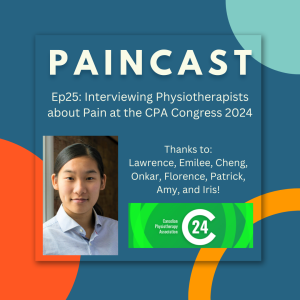
Monday Jun 03, 2024
Monday Jun 03, 2024
I had the pleasure and privilege of attending the annual Canadian Physiotherapy Association Congress in Beautiful Vancouver in April. This episode compiles 8 interviews I conducted during the congress with clinicians. I think this is one of the best ways to involve more clinicians in the discussion of pain and physiotherapy. Last year, I asked about their views on and approaches to pain. This year, I asked them about their feelings about treating pain, what they wish to learn more about, and a memorable experience as a clinician. I also have a student interview at the end.
Timestamp(00:01:31) Lawrence - MSK PT (00:09:20) Emilee - MSK PT, clinic owner @emiwhitt(00:18:35) Cheng, MSK PT, clinic owner @OTPerformanceRehab(00:27:14) Onkar, MSK PT, clinic owner @pfp_physio(00:34:03) Florence, MSK PT, clinic owner @northburnabyphysio(00:45:05) Patrick, MSK PT, clinic owner @thrivenowphysio(00:52:20) Amy, Ontario Physiotherapy Association staff, former primary care chronic pain group provider @chroniclesofhondronicols(01:03:28) Iris, first year PT student @irisw_pt
Paincast is dedicated to bringing together researchers, clinicians, and students to discuss topics related to pain and physiotherapy. The primary purpose is to facilitate knowledge translation and critical thinking. Some episodes posit themselves as more educational than others, and some more opinionated than others. The listener is encouraged to listen critically. While there is an effort to incorporate research evidence, and the topics are always researched by the host, we recognize there is room for improvement and there is expertise in the community. As such, we invite constructive critique and that you inform us of any inadvertent errors, so that we may correct them. You may submit your feedback through this form: https://forms.gle/UFfbUHBh8uKwSKgS8
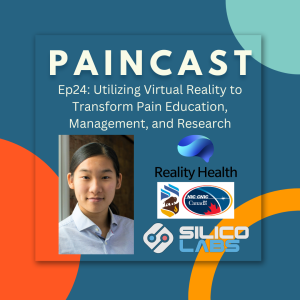
Saturday Mar 02, 2024
Saturday Mar 02, 2024
This episode showcases how Virtual Reality, VR in short, can be used to facilitate, advance, and even transform pain education, management, and research. You'll hear about a few different applications of VR in physiotherapy, including using VR as a tool for pain neuroscience education, VR for phantom limb pain, and VR for research. We also highlight the current literature related to these applications. Note that this episode is a limited demonstration of how VR can be used in different aspects of pain care and there are a lot more out there. Interested listeners can refer to the review papers I have cited in the episode description.
Timestamps:(00:01:14) Reality Health: VR as a tool for Pain Neuroscience Education (00:27:48) VR as a tool to prevent or manage Phantom Limb Pain (00:43:52) SilicoLabs: VR as a versatile research and clinical tool
Relevant resources:
VR for pain overview:
Ahmadpour, N., et al. (2019). Virtual Reality interventions for acute and chronic pain management. The international journal of biochemistry & cell biology, 114, 105568.
Trost, Z., et al. (2021). Virtual reality approaches to pain: toward a state of the science. Pain, 162(2), 325-331.
VR for phantom limb pain:
Limakatso, K., et al. (2020). The effectiveness of graded motor imagery for reducing phantom limb pain in amputees: a randomised controlled trial. Physiotherapy, 109, 65-74.
Purushothaman, S., et al. (2023). Assessment of efficiency of mirror therapy in preventing phantom limb pain in patients undergoing below-knee amputation surgery—a randomized clinical trial. Journal of Anesthesia, 1-7.
Cheung, J. C. W., et al. (2023). X-reality for phantom limb management for amputees: a systematic review and meta-analysis. Engineered Regeneration, 4(2), 134-151.
SilicoLabs: www.silicolabs.ca
Reality Health: https://reality.health/home/
Skidmore, N., et al. (2024). Acceptability and Feasibility of Virtual Reality to Promote Health Literacy in Primary Care from the Health Professional’s view: A Qualitative Study. Patient Education and Counseling, 108179.
Making pain education better: historical underpinnings & recent innovations – a discussion paper: https://www.petalcollaboration.org/uploads/1/4/4/1/144169171/moseley__ryan_petal_discussion_paper_making_pain_education_better_120923.pdf
Video introduction to the platform: https://vimeo.com/915832727/e6572e2a5c?share=copy
Paincast is dedicated to bringing together researchers, clinicians, and students to discuss topics related to pain and physiotherapy. The primary purpose is to facilitate knowledge translation and critical thinking. Some episodes posit themselves as more educational than others, and some more opinionated than others. The listener is encouraged to listen critically. While there is an effort to incorporate research evidence, and the topics are always researched by the host, we recognize there is room for improvement and there is expertise in the community. As such, we invite constructive critique and that you inform us of any inadvertent errors, so that we may correct them. You may submit your feedback through this form: https://forms.gle/UFfbUHBh8uKwSKgS8
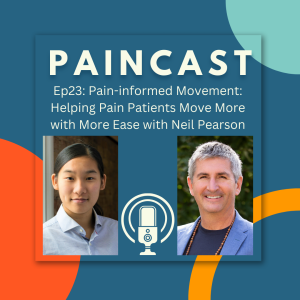
Monday Feb 05, 2024
Monday Feb 05, 2024
Neil Pearson is a physical therapist, yoga therapist, author, researcher, Clinical Associate Professor at the University of British Columbia, faculty in three IAYT-accredited yoga therapy programs, board member for International Association of Yoga Therapists and pain care advocate. He is the founding chair of the Canadian Physiotherapy Association’s Pain Science Division, and the recipient of awards honouring his work in pain care, patient education and physiotherapy by Queen’s University, the Canadian Pain Society, and Physiotherapy Associations of BC and Canada, including the Canadian 2021 Medal of Distinction. Neil is involved in research studying the effects of yoga and pain-informed movement practices on people with knee osteoarthritis, and has written numerous peer-reviewed papers on yoga, yoga therapy and pain, including a white paper describing the position of yoga therapy within comprehensive integrated pain management. He is a consultant to Partners in Canadian Veterans Rehabilitation Services, and to Lifemark’s 300+ clinics in Canada. Neil is a past board member for Pain BC, Canada’s premier non-profit transforming the way pain is understood and treated. He co-authored – Yoga and Science in Pain Care 2019, authored the patient education ebook, Understand Pain Live Well Again in 2008, and is lead contributor to many free patient resources offered by Pain BC. Neil provides physiotherapy and yoga therapy to veterans at the Broken Squirrel Clinic in Courtenay, BC.
In this episode, we talked about what pain-informed movement is, its underlying cognitive and neurophysiological mechanisms to help chronic patients move more with more ease, and practical considerations on implementing pain-informed movement. Enjoy!
Relevant resources:
www.paincareaware.com
https://lifeisnow.ca/
Blickenstaff, C., & Pearson, N. (2016). Reconciling movement and exercise with pain neuroscience education: A case for consistent education. Physiotherapy Theory and Practice, 32(5), 396-407.
Nijs, J., & Meeus, M. (2016). Five requirements for effective pain neuroscience education in physiotherapy practice. https://paininmotion.be/blog/detail/five-requirements-effective-pain-neuroscience-education-physiotherapy-practice
Modarresi, S., et al. (2023). Pain Informed Movement for people with knee osteoarthritis: Protocol for a pilot randomized controlled trial. Osteoarthritis and Cartilage Open, 5(4), 100402.
Paincast is dedicated to bringing together researchers, clinicians, and students to discuss topics related to pain and physiotherapy. The primary purpose is to facilitate knowledge translation and critical thinking. Some episodes posit themselves as more educational than others, and some more opinionated than others. The listener is encouraged to listen critically. While there is an effort to incorporate research evidence, and the topics are always researched by the host, we recognize there is room for improvement and there is expertise in the community. As such, we invite constructive critique and that you inform us of any inadvertent errors, so that we may correct them. You may submit your feedback through this form: https://forms.gle/UFfbUHBh8uKwSKgS8
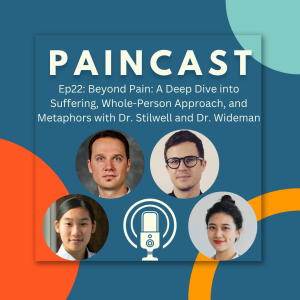
Saturday Jan 20, 2024
Saturday Jan 20, 2024
Dr. Peter Stilwell is a Postdoctoral Researcher at McGill University in the School of Physical and Occupational Therapy, where he holds a Fellowship from the Canadian Institutes of Health Research (CIHR). His research is focused on the topics of pain, suffering, and person-centered care. For the past two years, he was the Ronald Melzack Fellow in Chronic Pain Research at the Alan Edwards Centre for Research on Pain (AECRP) at McGill. He was recently awarded the MSCA Fellowship from the European Union, which he will start later this year at the University of Southern Denmark. He has a Doctor of Chiropractic degree from the Canadian Memorial Chiropractic College (CMCC) and has worked mostly with people living with persistent spinal pain and he placed an emphasis on patient education, exercise, and supported self-management. In addition to his research and clinical background, he has been heavily involved in teaching, student supervision, and community-based initiatives, including co-creating and facilitating a highly successful free health education and walking program that attracted over 1700 members.
Dr. Timothy Wideman is an associate professor at the School of Physical and Occupational Therapy, at McGill University. The overarching goal of his research program is to improve the lives of people living with pain. His lab works toward this goal by focusing on three streams of research including understanding and targeting biopsychosocial risk factors for prolonged pain and disability, improving entry-level pain education for health professionals through large-scale knowledge translation initiatives, and understanding and addressing pain-related suffering.
In this episode, we talked about an alternative framework to the biopsychosocial model for a whole-person approach to pain care, how metaphors are commonly used languages to describe pain, and the emerging theoretical research to better understand pain-related suffering.
Resources:
Twitter: @Peter_Stilwell
Website: www.drpeterstilwell.com
Open access paper on pain-related suffering: https://pubmed.ncbi.nlm.nih.gov/34852304/
Painful metaphors: https://mh.bmj.com/content/47/2/235
Dr. Timothy H Wideman website: https://www.mcgill.ca/spot/timothy-h-wideman
Tim’s twitter: @TH_Wideman
Paper published in 2023 on inclusive definition of pain-related suffering and targeted care: https://www.jpain.org/article/S1526-5900(22)00459-X/fulltext
Barker KL, et. al. Divided by a lack of common language? A qualitative study exploring the use of language by health professionals treating back pain. BMC Musculoskelet Disord. 2009; 10(123): 1-10.
Paincast is dedicated to bringing together researchers, clinicians, and students to discuss topics related to pain and physiotherapy. The primary purpose is to facilitate knowledge translation and critical thinking. Some episodes posit themselves as more educational than others, and some more opinionated than others. The listener is encouraged to listen critically. While there is an effort to incorporate research evidence, and the topics are always researched by the host, we recognize there is room for improvement and there is expertise in the community. As such, we invite constructive critique and that you inform us of any inadvertent errors, so that we may correct them. You may submit your feedback through this form: https://forms.gle/UFfbUHBh8uKwSKgS8
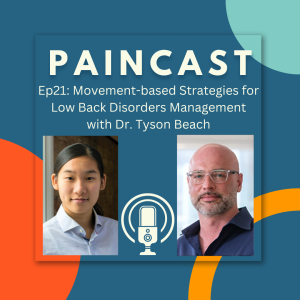
Wednesday Jan 10, 2024
Wednesday Jan 10, 2024
Dr. Tyson Beach is currently a teaching professor at the University of Waterloo, teaching courses on the biomechanics and assessment of human movement, exercise prescription, and low-back disorders. His previous research focused on quantitative motion analyses, prevention of work-related musculoskeletal disorders, and advancing fundamental knowledge of spinal mechanics, control, and injury causation. He also collaborates with other knowledge producers (researchers) and users (practitioners) to design, implement, and evaluate physical activity and exercise programs for workers and athletes.
In this episode, we discussed the literature on exercise interventions for low back disorders. Continuing the discussion from previous episodes (Ep19-20), we talked about factors affecting how people lift, movement-related strategies to manage low back disorders, and how we can encourage people to participate in physical activity.
Note that this episode presents perspectives in movement-based strategies for low back disorders through the lens of biomechanics and exercise. It is not an attempt to address the topic exhaustively, nor does it attempt to address all of low back disorders.
Relevant articles
Carnegie, D. R., et al. (2023). Can we enable individuals to reach further down without rounding their backs before beginning a lift? Examining the influence of starting foot and trunk position on reach depth. Ergonomics, 1-30.
Beach, T. A., et al. (2014). Unilateral ankle immobilization alters the kinematics and kinetics of lifting. Work, 47(2), 221-234.
Hayden, J. A., et al. (2021). Some types of exercise are more effective than others in people with chronic low back pain: a network meta-analysis. J Physiotherapy, 67(4), 252-262.
Owen, P. J., er al. (2019). Which specific modes of exercise training are most effective for treating low back pain? Network meta-analysis. British journal of sports medicine.
https://uwaterloo.ca/centre-of-research-expertise-for-the-prevention-of-musculoskeletal-disorders/resources/position-papers/there-no-such-thing-non-specific-back-pain
Discussion flow(00:01:19) How different task and personal constraints affect reaching or lifting abilities(00:05:32) Movement variability in the population(00:12:43) Non-specific low back pain and strategies for movement prescription(00:21:58) Are there specific exercise modalities that are more effective for low back pain? (00:25:20) Exercise helps no matter what and the psychosocial considerations(00:27:50) Thoughts on encouraging more movement and physical activity(00:31:22) Physical activity paradox(00:34:57) All types of physical activities are movement that stresses all systems(00:41:55) Concluding
Paincast is dedicated to bringing together researchers, clinicians, and students to discuss topics related to pain and physiotherapy. The primary purpose is to facilitate knowledge translation and critical thinking. Some episodes posit themselves as more educational than others, and some more opinionated than others. The listener is encouraged to critically reflect on the content. While there is an effort to incorporate research evidence, and the topics are researched by the host (Tiffany), we recognize there is room for improvement and there is expertise in the community. As such, we invite constructive critique and that you inform us of any inadvertent errors, so that we may correct them. You may submit your feedback through this form: https://forms.gle/UFfbUHBh8uKwSKgS8
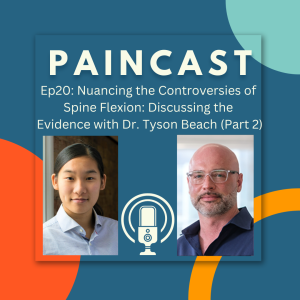
Sunday Jan 07, 2024
Sunday Jan 07, 2024
Dr. Tyson Beach is currently a teaching professor at the University of Waterloo, teaching courses on the biomechanics and assessment of human movement, exercise prescription, and low-back disorders. His previous research focused on quantitative motion analyses, prevention of work-related musculoskeletal disorders, and advancing fundamental knowledge of spinal mechanics, control, and injury causation. He also collaborates with other knowledge producers (researchers) and users (practitioners) to design, implement, and evaluate physical activity and exercise programs for workers and athletes.
This episode is a continuation of the discussion from the last episode. We continued to discuss important factors to consider when reading the literature relating to lifting and spine flexion. In this episode, we went more in-depth in spine biomechanics during lifting in different contexts.
Relevant articles (Part 2)
Frost, D. M., et al. (2015). Exercise-based performance enhancement and injury prevention for firefighters: contrasting the fitness-and movement-related adaptations to two training methodologies. J. Strength Cond. Res., 29(9), 2441-2459.
https://uwaterloo.ca/centre-of-research-expertise-for-the-prevention-of-musculoskeletal-disorders/resources/position-papers/improving-workplace-manual-handling-training-programs
Mawston, G.,et al. (2021). Flexed lumbar spine postures are associated with greater strength and efficiency than lordotic postures during a maximal lift in pain-free individuals. Gait & Posture, 86, 245-250.
Marras, W. S., et al. (1995). Biomechanical risk factors for occupationally related low back disorders. Ergonomics, 38(2), 377-410.
Marras, W. S.,et al. (1993). The role of dynamic three-dimensional trunk motion in occupationally-related low back disorders. Spine, 18(5), 617-628.
Dolan, P., et al. (1994). Passive tissues help the back muscles to generate extensor moments during lifting. J Biomech, 27(8), 1077-1085.
Dolan, P., & Adams, M. A. (1993). The relationship between EMG activity and extensor moment generation in the erector spinae muscles during bending and lifting activities. Journal of biomechanics, 26(4-5), 513-522.
Kalkhoven, J. T., et al. (2021). Training load and injury: causal pathways and future directions. Sports Med, 51, 1137-1150.
Adams MA. Biomechanics of back pain. Acupunct Med. 2004 Dec;22(4):178-88. doi: 10.1136/aim.22.4.178. PMID: 15628775.
Discussion flow(00:01:37) How movement-focused training facilitates the transfer of movement behaviour from training to work (00:05:51) Why typical occupational training does not work to change injury reporting (00:11:18) There is no universal safe way to lift for all people (00:15:05) Arguments for the irrelevance of flexion: "Most heavy lifting is associated with back pain", "everyone flexes when they lift", and anecdotes of people lifting flexed with no pain(00:19:09) How movement plays a role in load management in principle and in practice (00:26:19) Unpacking how flexed lifting postures produces greater lifting strength and efficiency(00:31:40) Meaning of "efficiency"(00:36:37) Ability to adapt to loading in active vs passive tissues (00:38:00) Details of multi-level spine modelling, flexion increases shear loading and decreases passive tissue tolerance(00:42:16) Different perspectives amongst biomechanists and meaning to the practitioners (00:43:32) Posture plays a role in load management (00:44:59) Neutral/lordotic posture creates muscle shear to counter external anterior shear (00:48:04) Relationship between flexion and compression forces along the column(00:51:14) Meaning of "neutral" on a tissue level, functional level, and practical level (00:55:53) Involvement of the flexion-relaxation phenomenon (00:59:27) Amount of flexion perceived in the eyes vs in the joints (01:01:53) What conclusion can we make? (01:04:35) What about powerlifting?
Paincast is dedicated to bringing together researchers, clinicians, and students to discuss topics related to pain and physiotherapy. The primary purpose is to facilitate knowledge translation and critical thinking. Some episode posit themselves as more educational than others, and some more opinionated than others. The listener is encouraged to critically reflect on the content. While there is an effort to incorporate research evidence, and the topic is researched by the host (Tiffany), we recognize there is room for improvement and there is expertise in the community. As such, we invite constructive critique and that you inform us of any inadvertent errors, so that we may correct them. You may submit your feedback through this form: https://forms.gle/UFfbUHBh8uKwSKgS8
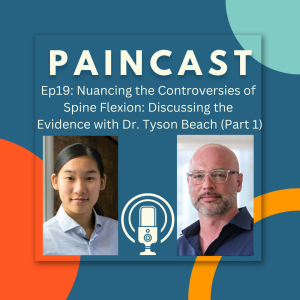
Tuesday Jan 02, 2024
Tuesday Jan 02, 2024
Dr. Tyson Beach is currently a teaching professor at the University of Waterloo, teaching courses on the biomechanics and assessment of human movement, exercise prescription, and low-back disorders. His previous research focused on quantitative motion analyses, prevention of work-related musculoskeletal disorders, and advancing fundamental knowledge of spinal mechanics, control, and injury causation. He also collaborates with other knowledge producers (researchers) and users (practitioners) to design, implement, and evaluate physical activity and exercise programs for workers and athletes.
In this episode, we discussed the epidemiological and biomechanical literature around lifting with spinal flexion. Acknowledging that biomechanics is only one of the many factors in low back disorders, the goal of the discussion is to highlight the nuances in understanding biomechanics literature rather than to provide a definitive answer to this topic.
Relevant articles (Part 1)
Saraceni, N., et al. (2020). To flex or not to flex? Is there a relationship between lumbar spine flexion during lifting and low back pain? A systematic review with meta-analysis. JOSPT, 50(3), 121-130.
Nelson, N. A., et al.. (2009). Quantifying relationships between selected work-related risk factors and back pain: a systematic review of objective biomechanical measures and cost-related health outcomes. Int. J. Ind. Ergon., 39(1), 202-210.
Wells, R., Van Eerd, D., & Hägg, G. (2004). Mechanical exposure concepts using force as the agent. Scand J Work Environ Health, 179-190.
Impellizzeri, F. M.,et al. (2023). Understanding training load as exposure and dose. Sports Med, 1-13.
Kalkhoven, J. T., et al. (2020). A conceptual model and detailed framework for stress-related, strain-related, and overuse athletic injury. J Sci Med Sport, 23(8), 726-734.
Callaghan, J. P., et al. (2001). Intervertebral disc herniation: studies on a porcine model exposed to highly repetitive flexion/extension motion with compressive force. Clin Biomech, 16(1), 28-37.
Gunning, J.L., et al. (2001). Spinal posture and prior loading history modulate the compressive strength and type of failure in the spine: a biomechanical study using a porcine cervical spine model. Clin Biomech, 16(6): 471 480.
Gooyers, C. E., et al. (2015). Exploring interactions between force, repetition and posture on intervertebral disc height loss and bulging in isolated porcine cervical functional spinal units from sub-acute-failure magnitudes of cyclic compressive loading. J Biomech, 48(13), 3701-3708.
Discussion flow
(00:01:35) Introduction(00:04:53) High-level summary of the flexion discussion(00:06:40) Discussion on the epidemiological evidence: Issues with measuring exposure(00:10:05) Discussion on the epidemiological evidence: Measurement of spine motion(00:12:55) Discussion on the epidemiological evidence: Reporting absolute vs normalized spine motion(00:16:03) The kinematic of flexion needs to be nuanced by the corresponding kinetic information and load distributions(00:17:50) The challenging nature of epidemiological work(00:20:12) Summarizing the epidemiological discussion(00:23:23) The necessity to contextualize "flexion"(00:24:56) Evidence from the ergonomic literature(00:26:58) Evidence from tissue biomechanics(00:29:43) Criticisms of evidence from tissue biomechanics(00:30:51) Caveat with using tissue disruption studies to understand low back pain(00:33:41) Nuancing tissue loading and adaptation(00:34:58) Short summary of discussion on the tissue biomechanics literature(00:36:06) Addressing the argument of facilitating tissue adaptation by progressively overloading spinal flexion
Paincast is dedicated to bringing together researchers, clinicians, and students to discuss topics related to pain and physiotherapy. The primary purpose is to facilitate knowledge translation and critical thinking. Some episode posit themselves as more educational than others, and some more opinionated than others. The listener is encouraged to critically reflect on the content. While there is an effort to incorporate research evidence, and the topic is researched by the host (Tiffany), we recognize there is room for improvement and there is expertise in the community. As such, we invite constructive critique and that you inform us of any inadvertent errors, so that we may correct them. You may submit your feedback through this form: https://forms.gle/UFfbUHBh8uKwSKgS8
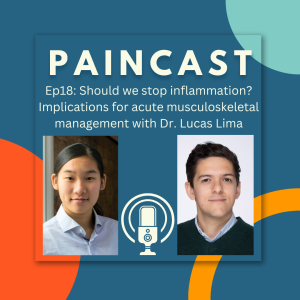
Sunday Dec 17, 2023
Sunday Dec 17, 2023
Dr. Lucas Lima is a research associate at the Alan Edwards Centre for Research on Pain at McGill University. He is a physiotherapist with a PhD and postdoctoral training in pain neuroscience. His latest research, published in the Science Translational Medicine journal, has garnered significant media attention for challenging current practices in acute musculoskeletal pain management, specifically the suggestion that NSAID’s might increase the risk of developing chronic pain.
In this episode, we talked about what inflammation is, recent evidence on the relationship between inflammation and chronification of acute pain, the benefits of exercise to prevent chronic pain, improve recovery of present and future injury, and evidence-based recommendations on NSAIDs and cryotherapy (icing) post-injury.
Resources
Main paper: https://www.science.org/doi/full/10.1126/scitranslmed.abj9954
Pain center Youtube page: https://youtu.be/751NtSbCh6Q?si=U7rFeRfYXzPgkUFZ
Dr. Lima's email: lucas.vasconceloslima@mcgill.ca
Paincast is dedicated to bringing together researchers, clinicians, and students to discuss topics related to pain and physiotherapy. The primary purpose is to facilitate knowledge translation and critical thinking. Some episode posit themselves as more educational than others, and some more opinionated than others. The listener is encouraged to critically reflect on the content. While there is an effort to incorporate research evidence, and the topic is researched by the host (Tiffany), we recognize there is room for improvement and there is expertise in the community. As such, we invite constructive critique and that you inform us of any inadvertent errors, so that we may correct them. You may submit your feedback through this form: https://forms.gle/UFfbUHBh8uKwSKgS8
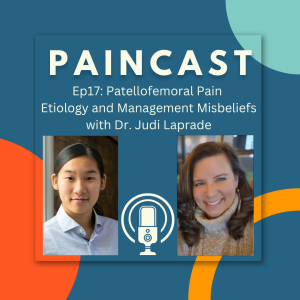
Sunday Dec 03, 2023
Sunday Dec 03, 2023
Dr. Laprade received her degree in Physical Education at the University of Western Ontario and then went on to complete her Physical Therapy degree, MSc and PhD in the Department of Anatomy at Queen’s University. She has previously taught Anatomy and Physical Therapy courses at Queen’s University and The Hong Kong Polytechnic University. Currently, she is the Anatomy Course Director for the Kinesiology & Physical Education, Dentistry and Physical Therapy programs at the University of Toronto. Dr. Laprade also teaches an exciting anatomy elective, ANA411Y: Anatomy in Application: Exercise & Biomechanics. Her research in the past has primarily focused on clinical assessment and evaluation of patellofemoral pain syndrome (PFPS) as well as acupuncture management of musculoskeletal disorders. More recently, she has embarked on developing and assessing educational tools for anatomy learning which are designed to enhance 3D learning.
In this episode, we talked about misbeliefs about patellofemoral pain etiology and management strategies, relationship between anatomy, biomechanics, empirical evidence, and clinical reasoning, and the importance for clinicians to keep up with anatomy and the literature.
Resources
Lan, T. Y., et al. (2010). Immediate effect and predictors of effectiveness of taping for patellofemoral pain syndrome: a prospective cohort study. AJSM, 38(8), 1626–1630. https://doi-org.myaccess.library.utoronto.ca/10.1177/0363546510364840
Barton, C., et al. (2014). Patellar taping for patellofemoral pain: a systematic review and meta-analysis to evaluate clinical outcomes and biomechanical mechanisms. BJSM, 48(6), 417–424. https://doi.org/10.1136/bjsports-2013-092437
Wilson, T., et al. (2003). A multicenter, single-masked study of medial, neutral, and lateral patellar taping in individuals with patellofemoral pain syndrome. JOSPT, 33(8), 437–448. https://doi.org/10.2519/jospt.2003.33.8.437
Tiu, T. Using Kinesiology Tape in Physiotherapy Practice for Pain Management. Physiotherapy Practice. Canadian Physiotherapy Association. Spring 2023. Available from https://physiotherapy.ca/app/uploads/2023/05/English.April28.pdf
Paincast is dedicated to bringing together researchers, clinicians, and students to discuss topics related to pain and physiotherapy. The primary purpose is to facilitate knowledge translation and critical thinking. Some episode posit themselves as more educational than others, and some more opinionated than others. The listener is encouraged to critically reflect on the content. While there is an effort to incorporate research evidence, and the topic is researched by the host (Tiffany), we recognize there is room for improvement and there is expertise in the community. As such, we invite constructive critique and that you inform us of any inadvertent errors, so that we may correct them. You may submit your feedback through this form: https://forms.gle/UFfbUHBh8uKwSKgS8
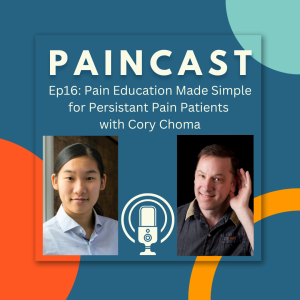
Thursday Nov 16, 2023
Thursday Nov 16, 2023
Cory Choma has been in clinical practice since 1996 and is a founding member of CSA. He is one of only 4 Clinical Specialists in Pain Science in Canada and one of a handful of people awarded an Honorary Fellowship at the Institute for the Study and Treatment of Pain. Cory has been teaching GunnIMS domestically and internationally since 2003 and is a senior instructor for the Continuing Professional Development branch of the Faculty of Medicine at the University of British Columbia. Cory is one of the contributing authors for the chapter on GunnIMS in the text ‘Trigger Point Dry Needling: An Evidenced and Clinical-Based Approach’.
In this episode, our discussion surrounds how we engage in therapy with those living with persistent symptoms—all about talk therapy. We talked about how pain education can be simplified, how the body and the mind affect one another, how the biopsychosocial model can be harmonized and manifested, and more.
Recommended resources for you:Singh, B. et al. (2023). Effectiveness of physical activity interventions for improving depression, anxiety and distress: An overview of systematic reviews. BJSM. http://dx.doi.org/10.1136/bjsports-2022-106195
The Upside of Stress by Kelly Mcgonigal
Brain Rules for Aging Well by John Medina
Why We Get Sick by Benjamin Bikman
Mindset by Carol S. Dweck.
Spark by John J. Ratey
Paincast is dedicated to bringing together researchers, clinicians, and students to discuss topics related to pain and physiotherapy. The primary purpose is to facilitate knowledge translation and critical thinking. Some episode posit themselves as more educational than others, and some more opinionated than others. The listener is encouraged to critically reflect on the content. While there is an effort to incorporate research evidence, and the topic is researched by the host (Tiffany), we recognize there is room for improvement and there is expertise in the community. As such, we invite constructive critique and that you inform us of any inadvertent errors, so that we may correct them. You may submit your feedback through this form: https://forms.gle/UFfbUHBh8uKwSKgS8


